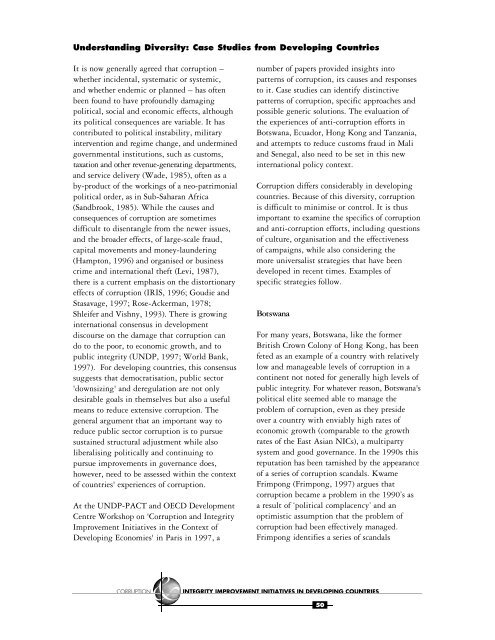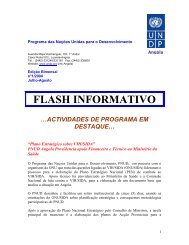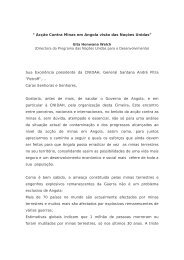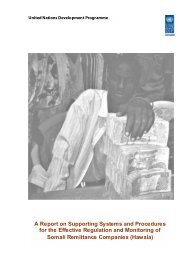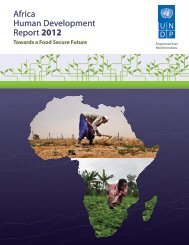CORRUPTION AND ANTI-CORRUPTION STRATEGIES ... - UNDP
CORRUPTION AND ANTI-CORRUPTION STRATEGIES ... - UNDP
CORRUPTION AND ANTI-CORRUPTION STRATEGIES ... - UNDP
Create successful ePaper yourself
Turn your PDF publications into a flip-book with our unique Google optimized e-Paper software.
Understanding Diversity: Case Studies from Developing Countries<br />
It is now generally agreed that corruption –<br />
whether incidental, systematic or systemic,<br />
and whether endemic or planned – has often<br />
been found to have profoundly damaging<br />
political, social and economic effects, although<br />
its political consequences are variable. It has<br />
contributed to political instability, military<br />
intervention and regime change, and undermined<br />
governmental institutions, such as customs,<br />
taxation and other revenue-generating departments,<br />
and service delivery (Wade, 1985), often as a<br />
by-product of the workings of a neo-patrimonial<br />
political order, as in Sub-Saharan Africa<br />
(Sandbrook, 1985). While the causes and<br />
consequences of corruption are sometimes<br />
difficult to disentangle from the newer issues,<br />
and the broader effects, of large-scale fraud,<br />
capital movements and money-laundering<br />
(Hampton, 1996) and organised or business<br />
crime and international theft (Levi, 1987),<br />
there is a current emphasis on the distortionary<br />
effects of corruption (IRIS, 1996; Goudie and<br />
Stasavage, 1997; Rose-Ackerman, 1978;<br />
Shleifer and Vishny, 1993). There is growing<br />
international consensus in development<br />
discourse on the damage that corruption can<br />
do to the poor, to economic growth, and to<br />
public integrity (<strong>UNDP</strong>, 1997; World Bank,<br />
1997). For developing countries, this consensus<br />
suggests that democratisation, public sector<br />
'downsizing' and deregulation are not only<br />
desirable goals in themselves but also a useful<br />
means to reduce extensive corruption. The<br />
general argument that an important way to<br />
reduce public sector corruption is to pursue<br />
sustained structural adjustment while also<br />
liberalising politically and continuing to<br />
pursue improvements in governance does,<br />
however, need to be assessed within the context<br />
of countries' experiences of corruption.<br />
At the <strong>UNDP</strong>-PACT and OECD Development<br />
Centre Workshop on 'Corruption and Integrity<br />
Improvement Initiatives in the Context of<br />
Developing Economies' in Paris in 1997, a<br />
number of papers provided insights into<br />
patterns of corruption, its causes and responses<br />
to it. Case studies can identify distinctive<br />
patterns of corruption, specific approaches and<br />
possible generic solutions. The evaluation of<br />
the experiences of anti-corruption efforts in<br />
Botswana, Ecuador, Hong Kong and Tanzania,<br />
and attempts to reduce customs fraud in Mali<br />
and Senegal, also need to be set in this new<br />
international policy context.<br />
Corruption differs considerably in developing<br />
countries. Because of this diversity, corruption<br />
is difficult to minimise or control. It is thus<br />
important to examine the specifics of corruption<br />
and anti-corruption efforts, including questions<br />
of culture, organisation and the effectiveness<br />
of campaigns, while also considering the<br />
more universalist strategies that have been<br />
developed in recent times. Examples of<br />
specific strategies follow.<br />
Botswana<br />
For many years, Botswana, like the former<br />
British Crown Colony of Hong Kong, has been<br />
feted as an example of a country with relatively<br />
low and manageable levels of corruption in a<br />
continent not noted for generally high levels of<br />
public integrity. For whatever reason, Botswana's<br />
political elite seemed able to manage the<br />
problem of corruption, even as they preside<br />
over a country with enviably high rates of<br />
economic growth (comparable to the growth<br />
rates of the East Asian NICs), a multiparty<br />
system and good governance. In the 1990s this<br />
reputation has been tarnished by the appearance<br />
of a series of corruption scandals. Kwame<br />
Frimpong (Frimpong, 1997) argues that<br />
corruption became a problem in the 1990’s as<br />
a result of ‘political complacency’ and an<br />
optimistic assumption that the problem of<br />
corruption had been effectively managed.<br />
Frimpong identifies a series of scandals<br />
<strong>CORRUPTION</strong>& INTEGRITY IMPROVEMENT INITIATIVES IN DEVELOPING COUNTRIES<br />
5 0


